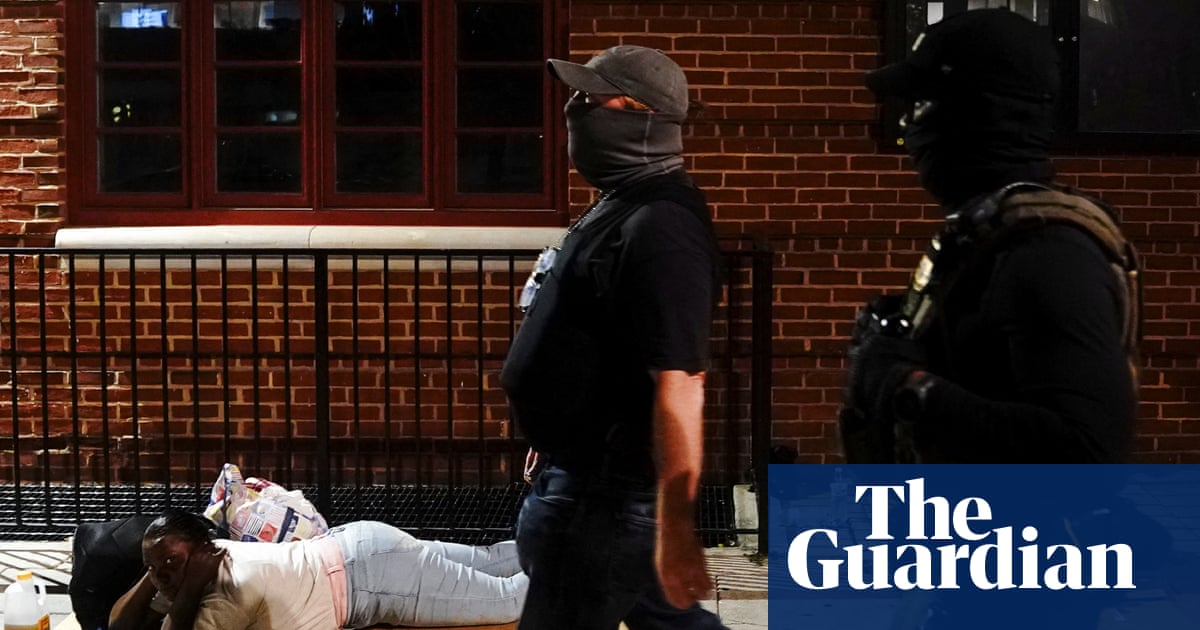The battle over a hastily orchestrated attempt to redraw Texas congressional districts at the urging of Donald Trump kicked off its first hearing on Thursday – but it was Democrats who did most of the talking before Republicans cut the public session short.
Several of the state’s most prominent Democratic politicians and progressive activists rallied in front of the capitol ahead of the first of three public hearings to gather public comment on the proposed redistricting plan. Speaking through a bullhorn to a crowd of perhaps 150 activists waving signs with slogans such as “prevent floods, not votes”, they took turns excoriating Texas Republicans for prioritizing redistricting over helping victims of the devastating Hill country floods during the legislature’s special session and for bowing to Trump’s pressure to redistrict several years ahead of schedule.
“We gotta tell Greg Abbott to cut the bullshit,” said Leonard Aguilar, the secretary-treasurer of the Texas AFL-CIO. “He’s blatantly using this special session to push Trump’s political agenda.”
“They’re trying to suppress,” Aguilar added. “It is what it is. They’re trying to stop Black and brown voters… They know they’re in trouble and the only way they can control and keep the power is to cheat.”
Beto O’Rourke, the former US representative, echoed his previous calls for Democrats to beat Republicans at their own game, by more aggressively gerrymandering blue states like California, New York or Illinois.
“What if, instead of waiting for the punch thrown by the other side, we punch first?” O’Rourke asked the crowd, drawing cheers.
The GOP holds solid majorities in both chambers of the Texas legislature as well as the governorship, giving Democrats few tools to block Republicans from redrawing the map. But both O’Rourke and Gina Hinojosa, a Texas state representative, raised the possibility of denying Republicans the minimum number of lawmakers needed to pass a redistricting bill – a nuclear option that Texas Democrats have used in the past.
“So what do we do?” Hinojosa asked the crowd. “We protest. We rally. We testify. And most importantly, we organize. And yes, with my colleagues, I am prepared to break quorum.”
The White House’s push to more aggressively gerrymander the Lone Star state to protect Trump’s slim House majority from crumbling in the 2026 midterm election has put Republicans locally in an awkward position. The map that the GOP-dominated legislature approved back in 2021 already strongly favors Republicans, who hold two-thirds of congressional seats despite winning only 55% of the vote. Tweaking it in an attempt to create new GOP-friendly districts could easily put seats the GOP currently holds at risk.
At Thursday’s hearing, Republican members of the House committee on redistricting remained largely silent as a parade of Democratic elected officials, voting rights activists and frustrated voters overwhelmed public testimony.
“I think it’s telling that there’s not a single Republican member of Congress to say, ‘I think this is a good thing,’” said Joaquin Castro, a Democratic representative of San Antonio, at the hearing. “I think that’s very strange.”
The Department of Justice sent a letter to Texas officials on 7 July raising “serious concerns” that four districts, three in Houston and one Dallas-Fort Worth, were racially gerrymandered. Texas Republicans have maintained since 2021 that they were not – including in an ongoing voting rights act trial in federal court in El Paso. Despite broad concerns from Texas Republicans, Abbott added the item earlier this month to a previously scheduled 30-day special session of the legislature after speaking by phone with Trump, according to The Texas Tribune.
Cody Vasut, the committee’s Republican chairman, appeared unfamiliar with the justice department letter and said he did not himself feel concerned the 2021 map raised constitutional problems or violated federal law.
“The chair’s position is that every map he’s ever voted for complies with the constitution,” Vasut said.
after newsletter promotion
A line snaked out the door of the hearing, which the committee held in a room with a capacity to seat 50 people. Most who came to testify watched a livestream of the hearing in one of three overflow rooms.
There weren’t many specifics for the public to comment on, because lawmakers have yet to propose new district maps. But many raised concerns that state legislators would further dilute the black and brown electorate in a state where Republicans already control two-thirds of the congressional seats while winning only about 55% of the vote.
And critics repeatedly portrayed Republicans as tools of a president that didn’t have their best interests in mind.
“If there’s anything I don’t like, it’s being played,” said Angela Valenzuela, a professor of education who testified on behalf of the League of United Latin American Citizens. “And y’all are being played big time. Have some self-respect.”
Democrats moved to a separate room to continue informal public testimony after Vasut denied a request to prolong the hearing. Opponents continued to register their opposition for more than an hour. The following day, House Democrats sent two delegations out of state – one to California and the other to Illinois – to strategize
While Texas Democrats worry that Trump plans to use their state as a staging ground for a broader gerrymandering push, the effort could help fortify the party locally, according to Mark Jones, a professor in the department of political science at Rice University. It brings the party together, while leaving Republicans struggling to respond and potentially losing seats in a midterm election.
Presidents often face setbacks in midterm elections. A poll Jones helped conduct in May asked Texas voters who cast a ballot in 2020 who they would vote for if the election were held today. Trump’s margin of victory over Democratic candidate Kamala Harris had dwindled six points from 14 to 8% – perhaps an early indication that Trump’s gamble may wind up working against him.
“Virtually all Republicans know this is a bad idea – it’s far more likely to hurt Texas Republican political power than to help it,” Jones said. “But no one wants to say ‘no’ to President Trump – because we’ve learned what happens when you say ‘no’ to President Trump.”

 German (DE)
German (DE)  English (US)
English (US)  Spanish (ES)
Spanish (ES)  French (FR)
French (FR)  Hindi (IN)
Hindi (IN)  Italian (IT)
Italian (IT)  Russian (RU)
Russian (RU)  3 weeks ago
3 weeks ago
























Comments